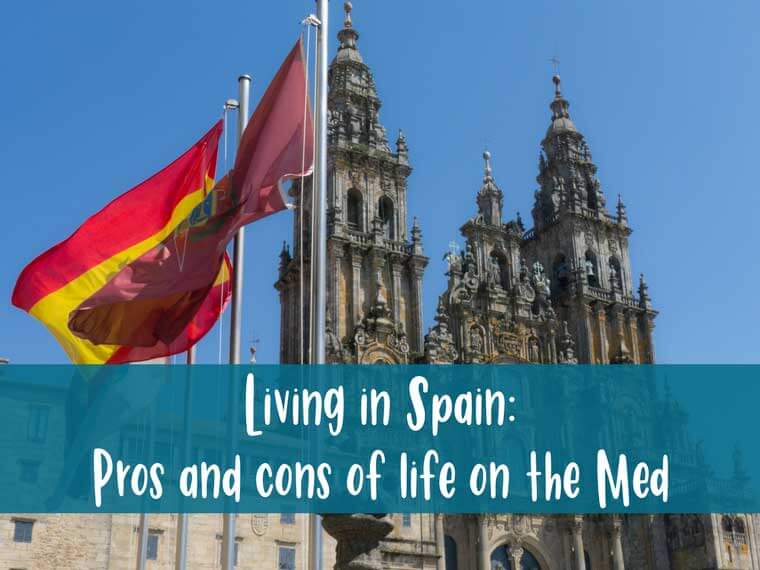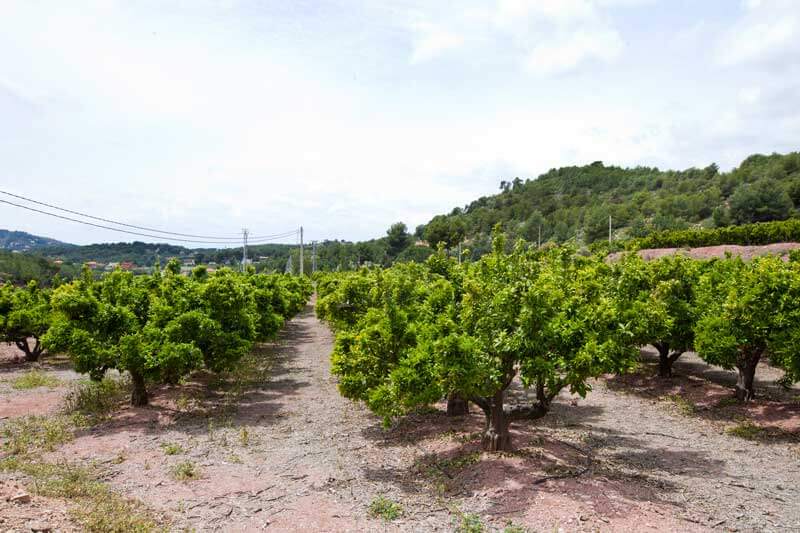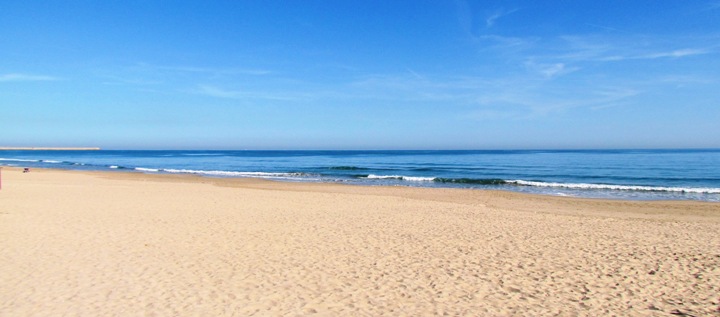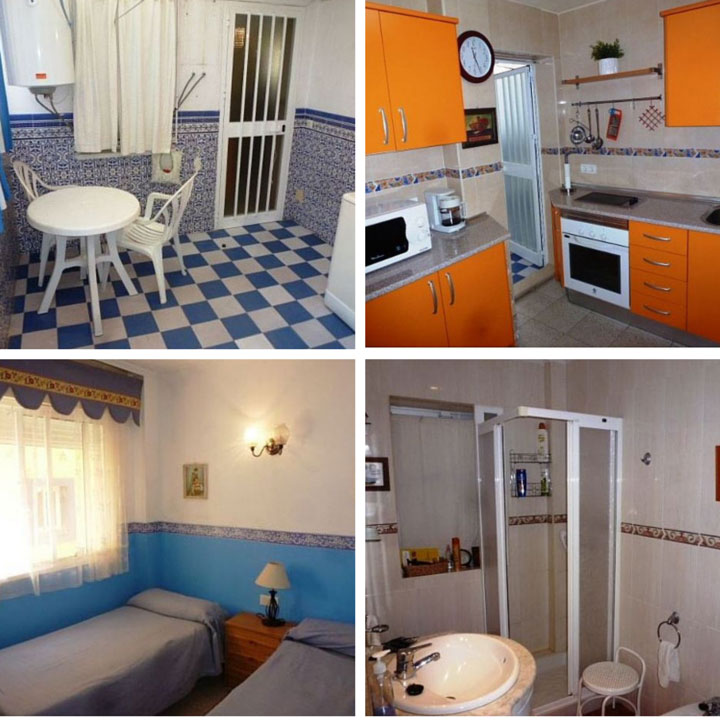
Want a completely subjective living in Spain pros and cons list? Haha. Well lucky for you, I wrote one.
I look back at our time living in Spain for six months and they are some of the best memories of my life. But that’s not to say we loved every minute of life in Spain.
Some parts of Spanish life did not sit well with us at all.
That said we are working our tails off to get to a stage where we can move to Spain fulltime, so nothing on the list below is anything we can’t work through.
I’ve debated writing about the pros and cons of living in Spain as I am just one person and my opinion is just that – an opinion.
But, in my research, I enjoyed reading about the personal experiences of others, so in that vein, I will share with you my living in Spain pros and cons list.
Please remember that my experience might not be the same as yours. I am also very laid back about pretty much everything (it’s a New Zealand thing, we’re a chilled out nation), so I’m quite likely to just brush something off and move on.
So with that disclaimer, let’s begin.
Living in Spain – Pros and Cons
Let’s start with the positives (and there are many great things about life in Spain).
Pros of living in Spain
Food
Fresh fruit and veggies are cheap and always available from the local fruit and veg shop. Of which there is one on almost every corner.
The price of fresh fruit (grown locally) and veggies was one of the highlights of our time in Spain. I could duck down to the fruiteria and fill two large plastic grocery bags for about 5euro.
To buy the same amount in New Zealand would cost at least $30.
Now, if you’re coming from the UK or Ireland and you’re used to Aldi’s super 6 where you get really cheap deals on fruit and vegetables, this might not seem cheap, but compared to almost anywhere else in the world fresh fruit and veg is super cheap and high quality.

Cost of living
The low cost of living in Spain is a huge plus. Our Spanish living costs were very low for the lifestyle we had.
That, of course, is relative to your own situation.
I’m frugal and we try to save money where we can. If you spend a lot at home, you’ll find plenty of places to spend money in Spain.
But if you’re careful with your money, it can stretch a long way.
As a general rule we spent less on rent and groceries than we would at home, but more on eating out (because at 1.60e for a coffee and croissant, I’m having one every morning).
We could have shaved our food bill by a quarter or more had we decided to cook meals at home all the time, but prices for eating out in Spain were very reasonable.
We found food in Madrid, Seville and Malaga to be uber-cheap and there were so many options available.
It definitely wasn’t just on the Costa del Sol where cheap food and drink were available.

Frugal Living
I like to save a buck (or euro in this case) and the overarching benefit of living in Spain was the ability to have a great life on a small budget.
Not just because things are cheaper there (than New Zealand anyway) but because the best things in life are available in Spain for no cost at all.
Sunshine, beaches, fresh air, happy people, wine and coffee can be enjoyed for very little money.
Sunshine
The incredible weather in Spain (well in our part of Spain) meant we could be outdoors every single day (bar 1 week of rain).
Most days after the toddler’s nap, we’d head to the beach for the afternoon where we could happily stay until sundown, even in winter.
Public Transport
The transport systems in Spain were fantastic for us.
We lived in a town (small city – maybe) just down the coast from Malaga.
We were able to get around Spain by train on the Cercanias network via Malaga and around our local city by bus.
Walkability
If you live in a small village you’ll probably need a car. But any decent-sized town will have public transport options or 95% of the time walking or biking is possible with the climate.
Lack of fast food chains
I absolutely loved that we had to make a big effort to get Burger King or McDonald’s.
Fast-food chains are in Spain, sure, but not like in New Zealand or the U.S. or even the U.K. where there seems to be a fast-food joint on every corner.
Our local cafe served a slice of gourmet pizza and a cafe con leche (coffee with milk) for 2.95 which became our go-to fast food.
Shopping Trolleys
Because most people around our area lived in apartments they either didn’t have a car or just didn’t use it so getting the groceries required slightly more effort than at home.
The first thing I noticed when visiting a Spanish supermarket for the first time was the mass of shopping trolleys parked at the entrance of the store.
The stores provided lockable chains for a coin deposit, so you could keep your shopping trolley safe.
There are so many benefits of using a shopping trolley, namely being able to haul loads of stuff when you’re on foot and not needing plastic bags!
They’re also sturdy as heck for going up and down the many footpath humps and cracks.
I could not believe my luck that our landlord had left one for us to use during our stay. It was the best thing ever and I swore to myself that I’d buy one to use when I got home but I still haven’t.
The first thing I buy when we make the move back to Spain is a stylish shopping trolley.
It’s pretty much the entire reason we could live car-free in Spain.
People, people everywhere
Another side effect of living in apartments and perhaps a lower car ownership rate is that people get out and about regularly on foot.
It felt like there were always people hanging out at the plaza or the playground, or just on the streets. It felt alive and much different to suburban life in New Zealand (or any similar nation).
Cons
So now that I’ve told you why I adore Spain and can’t get her out of my head (she’s the one for me, I’m telling ya!), I need to tell you some things she could work on.
Animal treatment
One day I was sitting in my apartment working when I heard an awful whimpering ‘meow’.
Upon closer inspection, I found a cat, terrified and perhaps injured in the alcove where the electricity meter lived, in the apartment building opposite us.
The noise had gone on for hours before I finally decided to investigate, and it wasn’t even in my building. At least 50 people would have walked past and ignored the cat.
I’m not even a cat person, but I couldn’t just let the poor creature suffer.
As I started to attend to the cat, I was screamed at by a lady who lived in the building to leave the cat alone. I’m guessing she wanted it to die but I could not allow that to happen.
I went online to search for local SPCA equivalents and found nothing.
As the heat of the sun bore down on the cat I made an impromptu shelter with a cardboard box and kept her milk bowl full.
I had no idea what to do next. At least 4 hours passed before finally someone in the building called the animal rescue organisation and the cat was coaxed out of her alcove.
A man on the street later explained to me that people in Spain are having a rough time economically, and animals suffer as a result. This makes sense, but it still doesn’t sit right with me.
Related post: 6 Tips for Travelling to Spain with Your Dog
Dog poo
If cats are pests, then dogs must be gods because it seems like every second person keeps a dog as a pet in their apartment.
Which of course means that when the dog gets to go outside for a walk, they will use the toilet. Which might be the footpath, or the lovely green park area, or just the middle of the plaza.
All of that would be fine if the dog’s owner would pick up the poo. I’m sure some of them do, but judging by the amount of dog poo lying on footpaths all over the place, it’s not common practice.
Dog poo seemed to dominate any kind of outdoor or green space where we took Dylan to play. Dog poo is one of the reasons we are hesitant to return to Spain with a toddler who likes to play with anything he finds on the ground.
Don’t believe me? Read this hilarious story on how the town of Brunete enlisted top ad agency Mccann to solve their dog poo problem. The link should open in a new tab so you can come right back
Cold apartments

We began our time in Spain in January.
In a sheltered apartment (no sun) with tile floors, no insulation, single glazed windows and no heating at all. It was freezing!
Spanish apartments are not made for winter weather. The first things we bought were a rug and an electric heater to attempt to keep warm.
After February, the heater was no longer necessary but if you’re moving to Spain, please keep in mind that you might need to spend some money making your apartment warm for the winter (which luckily doesn’t last too long).
No Sunday trading
For some people, a lack of Sunday trading might be a dream come true, but this xennial suffered. I want my shops open 7 days a week thank you.
It was like the 1980s in New Zealand, with a half-day Saturday and no trading on Sunday at all.
Whilst, not a huge deal, we did become very good at planning the weekly grocery shop so we wouldn’t be stuck for milk on a Sunday morning. The same thing applies to public holidays where everything is closed.
So that’s a little insight into our pros and cons of living in Spain. Obviously, your preferences will be different, and there is nothing on this list that stops us wanting to move to Spain for the long-term.
Related:

Thank you! I just had a talk with my landlord here in Alicante last night about the electricity bill, It’s so cold here and there’s NO heating. Just like you said – sheltered apartment, no direct sunlight, tile floor… I’m not used to that. So I bought a heater. The funny this is, even the electric fuse is not suitable for heating. It’s only 7.5 A! I can use the heater and… nothing else. It’s ridiculous. And my heater is using more electricity than the whole host family uses for everything else. So I’ve agreed to pay for the extra electricity, of course, but the fuse still blows a few times a day and that’s just not how things are supposed to be. Either those Spaniards are really very frugal, or just plain ill-prepared. Thank you for writing that – at least I don’t feel like something’s wrong with me anymore ?
Oh Belle, the electricity drove me bonkers! And the switch would trip multiple times per day, so we’d have to reset it at the fusebox to turn the power back on. I really don’t know how the Spaniards survive in winter because the houses are completely ill-equipped. The shaggy rug made such a difference, and also made our place feel more homely which was nice. I hope you get warmer weather soon (and I love Alicante, it’s such a beautiful city, but the wind was cold when we were there last April.)
I moved to Ayora region in September to avoid another winter in the UK. Having spent my first winter in Spain it was the worst experience of my life the weather is not sunny it is very very cold .The houses are even colder and are not built to keep the cold out or heat in . Any form of heating be it wood gas or electric is extremely expensive and it would be cheaper to buy the substation than heat a house using any form of electric heating . To have any form of central heating system installed is twice the cost of the U.K. I have had numerous quotes and the lowest is 8,000 euros for three bed house. The cost to run central heating and all the hot water you want plus electric was £65.00 per month in UK here it has cost 150euros per month and that is no central heating just hot water and a wood burner to heat the living room. I have to say that this is the first and last winter I shall spend in Spain as the extra cost of heating and electric make living in Spain no cheaper just colder
Wow, Lucy! That is crazy money. I completely agree with you, although we were in the CDS so it was warmer there. But if we go back for winter, I’ll be bringing all our New Zealand winter weight gear including thermal underwear – for sunny Spain – ha. Those apartments and houses are freezing!
Wow, I’d been thinking of retiring to Spain, but this convinces me that it’s not for me. I don’t want to freeze in the winter and I don’t want to pay gazillions of $$$ not to! lo.
Thanks for article.
Nooo! Don’t give up on Spain. Just choose your apartment/house wisely. The cold is real but it can be dealt with and it doesn’t last long (I’m thinking we were truly cold for about 6-8 weeks max). Not long, really.
Hi. How can I subscribe to your posts?
I am evaluating Lisbon, Malaga, and Valencia. Any bit of info is helpful.
My biggest disappointment is smoking everywhere, all the time, by almost anyone.
I can not believe that it still didn’t sink in that second hand smoking is killing children and everyone around you. I see parents with babies in their arms and cigarettes near their faces. There is no “no smoking” area in restaurants and cafes and I had to leave numerous times because I was choking. C’mon Spain! Get into the 21st century!
If you come to the south of Spain you can forget about the cold. Everything you have said depends on the city where you live. Also in each province there are mountain villages where life is very different from the city. There are options for everyone.
I came across this while doing some procrastinating, and I think maybe you could use a different perspective:
I’m a Spaniard myself, from Valladolid to be more precise, and our houses are perfectly prepared to deal with the cold. Anywhere the temperature drops under minus 5-10 degrees (most of the interior, by the way) will have everything you need to keep warm during winter.
In any case, heating and electricity are things you should check before you rent/buy a place, especially if you’re a frioler@. As for the smoking thing, I agree, but if you think it’s bad now, you should have come ten years ago…
The no Sunday trading is also relative, I live in a teeny tiny village and the only shop is open until 14.00 on Sundays.
And lastly, a piece of advice for anyone living here: please, please, please make an effort to learn the language; I know people who’ve lived here 20-odd years and still have no clue and no interest, and quite frankly, it’s annoying and to a certain point, rather disrespectful.
Good luck to all!
Thanks so much for commenting Anna. I really hope my post didn’t come across as disrespectful. I am very grateful for the new word to add to my vocab – friolera. Muchas gracias.
Great info – Spain’s combo of weather and low cost of living wins the ‘Europe’ contest. We are moving from US in next 18 months and looking for best spot – somewhere near Alicante. Cheers
Nice to meet another fan! All the best with your move, Thomas.
We are moving to Malaga next year, husband is getting a transfer from Auckland NZ.
We won’t have a car so thought living in central city might be a better option.
We are also bringing along our six year old puppy dog.
I plan on taking Spanish lessons of which I am both excited and scared as I’m useless at pronouncing. I shan’t be working, I hope I can link into groups.
But nervous but ready to embrace change.
Sharron
Hi Sharron, we live in Christchurch atm! We will be in Malaga too so definitely get in contact when you arrive and we can have coffee if you like?